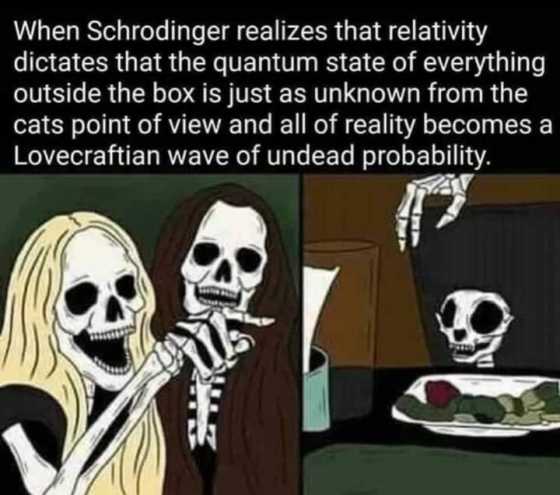2022.04.05
I bought Dirac's book, in the gray Boringhieri edition. It smelled good. (I always sniff books before buying them: the smell of a book is decisive.)
Individual objects are the way in which they interact. If there was an object that had no interactions, no effect upon anything, emitted no light, attracted nothing and repelled nothing, was not touched and had no smell . . . it would be as good as nonexistent. To speak of objects that never interact is to speak of something--even if it existed--that could not concern us. It is not even clear what it would mean to say that such objects "exist." The world that we know, that relates to us, that interests us, what we call "reality," is the vast web of interacting entities, of which we are a part, that manifest themselves by interacting with each other. It is with this web that we are dealing.
The discovery of quantum theory, I believe, is the discovery that the properties of any entity are nothing other than the way in which that entity influences others. It exists only through its interactions. Quantum theory is the theory of how things influence each other. And this is the best description of nature that we have.In high school I wrote a poem that I think carries a similar energy.
A rock sat in the woods, thinking,
for many years, of many things.
Realized God and His plan
How to perfect life for plant and man
but it was a rock, and rocks can't speak
so it had to keep it to itself
In other words, the entire value of interiority is ENTIRELY dependent on the ability to make connections outside. Surfaces vs Essences. While it's a bit fraught to seek out books to confirm one own's pre-existing notions, I am so pleased that this book really leans into the idea of interactions - what it calls the "relational" interpretation of quantum theory - as being so central to everything.
If we look at things in this way, there is nothing special in the "observations" introduced by Heisenberg: any interaction between two physical objects can be seen as an observation.That confirms another notion I have; the language of "observer" for quantum events (especially when inflated to macro events, ala Schrödinger's cat (which Rovelli nicely changes to a cat w/ a sleeping draught, no need for so many dead cats)) is a little misleading. It invites questions like "well what defines observer, does it have to be conscious" and from their speculation into the connection between consciousness and the quantum... but really, ANY interaction is an "observation".
The fact that we live at the bottom of a deep gravity well, on the surface of a gas covered planet going around a nuclear fireball 90 million miles away and think this to be normal is obviously some indication of how skewed our perspective tends to be.
If we imagine the totality of things, we are imagining being outside the universe, looking at it from out there. But there is no "outside" to the totality of things. The external point of view is a point of view that does not exist. Every description of the world is from inside it. The externally observed world does not exist; what exists are only internal perspectives on the world which are partial and reflect one another. The world is this reciprocal reflection of perspectives.So, this can be seen a serious challenge to my view of "the only thing that matters is the objective truth" - the "view from God's throne whether or not there's a divine butt in that chair", the idea of an objective yardstick, where any authority only matters in the sense that it is a better or worse mirror of that absolute truth. If that kind of view doesn't exist, is a kind of meaningless term even... well, it doesn't seem like the best thing to build a sense of morality and epistemology around!
I guess I look for an "out" to reconcile my view with Rovelli's point - the overlap may deal with "probabilities". The uncertainty about any given view being accurate to "The Truth" is so fundamental to this idea as I live it - I find any faith suspect; every view needs to be amenable to alteration, or else it's just dogma.
Like it's all about predictions. Theories about stuff that will happen, where that critical interaction that creates reality is yet to have have happened - that's what I'm thinking about. You could have a theory that says tomorrow ducks will go moo or rocks will start floating in midair, but that theory very likely to be confirmed! So maybe, then, when I talk about "most accurate view of the Truth" as a way of comparing different viewpoints, what I really mean is what are the most LIKELY to be proven true once the interaction has occurred.
It reminds me of the other part of my outlook, that any system that depends on belief in a one time, "special revelation" is suspect. (And a lot of faiths really bank on that kind of event). And I guess it's because if the "chain of interactions" from the supernatural event or revelation is so thin, that it just seems unlikely that there aren't more interactions we can have in the meanwhile to verify the Truth of the thing.
Nature follows its simple rules, but the complexity of things often renders the general laws irrelevant to us. Knowing that my girlfriend obeys Maxwell's equations will not help me to make her happy.
However mysterious the mind-body problem may be for us, we should always remember that it is a solved problem for nature. All we have to do is figure out that solution by naturalistic means.
External perception is an internal dream which proves to be in harmony with external things; and instead of calling 'hallucination' a false perception, we must call external perception 'a confirmed hallucination.'

